online tv platformvideo license securitystreaming platformvideo encoding
OBBOD We developed a Czech Netflix with a million views in two weeks
In less than a year, we created a Czech streaming platform, which was tested from the beginning by the successful Czech series Vysehrad. Obbod TV also handled 12,000 requests per second and a million views in two weeks. It was a large-scale project with a high number of integrations, for which a quality analysis and proof of concept were needed before the development itself.
Clear specification: streaming platform for Czech content
In 2015, entrepreneur Kamil Ouška addressed us with a tender for a Czech online TV platform. His vision was clear: the result should be something like Czech Netflix. Even after this one sentence, we understood what the client needed and the design of the solution slowly started taking shape in our minds.
Specifically, the streaming platform should:
- Target Czech viewers, but also be able to switch to other languages;
- Spread original content similar to Netflix or HBO GO;
- Be ready to launch within one year;
- Be robust enough to cope with large numbers of viewers;
- Be built so well as to allow entry into foreign markets in the future.
It was a great challenge for us as we were stepping foot in some areas for the first time. However, because we already had experience with other large projects (e.g., the online Exapro B2B marketplace with used machines, which operates worldwide), we were able to design a reasonable phasing that would prevent risks.
„We saw the opportunity to work on an online streaming platform as a challenge and we enjoyed it. However, we had to analyze such a large project well, identify the risks, and gradually eliminate these from the very beginning.“
František Salava,
Project manager
About Obbod TV
Obbod is a Czech internet television platform founded by Kamil Ouška, originally an energy entrepreneur. For Obbod online TV, the comedy series Vysehrad in 2016 was a breakthrough. It is a satirical series from the world of football from Obbod TV's own production. They followed up on the success with the Lajna series from the world of hockey.

500+
films and series online5 000+
views daily12 000+
requests per secondFirst, we needed to understand the market
We put together a team and started introductory workshops focused on a feasibility and competition analysis. During the analysis, we looked at market trends and the strengths and weaknesses of services such as Netflix, Hulu, Amazon, O2, Voyo, Alza media, and Stream.cz. We examined also classic television stations such as Prima, HBO, UPC, and Czech Television/ Ceska televize.
We focused on:
- number of views;
- subscription price; and
- special features.
Then we prepared a feasibility study, where we considered the technical possibilities of project implementation.
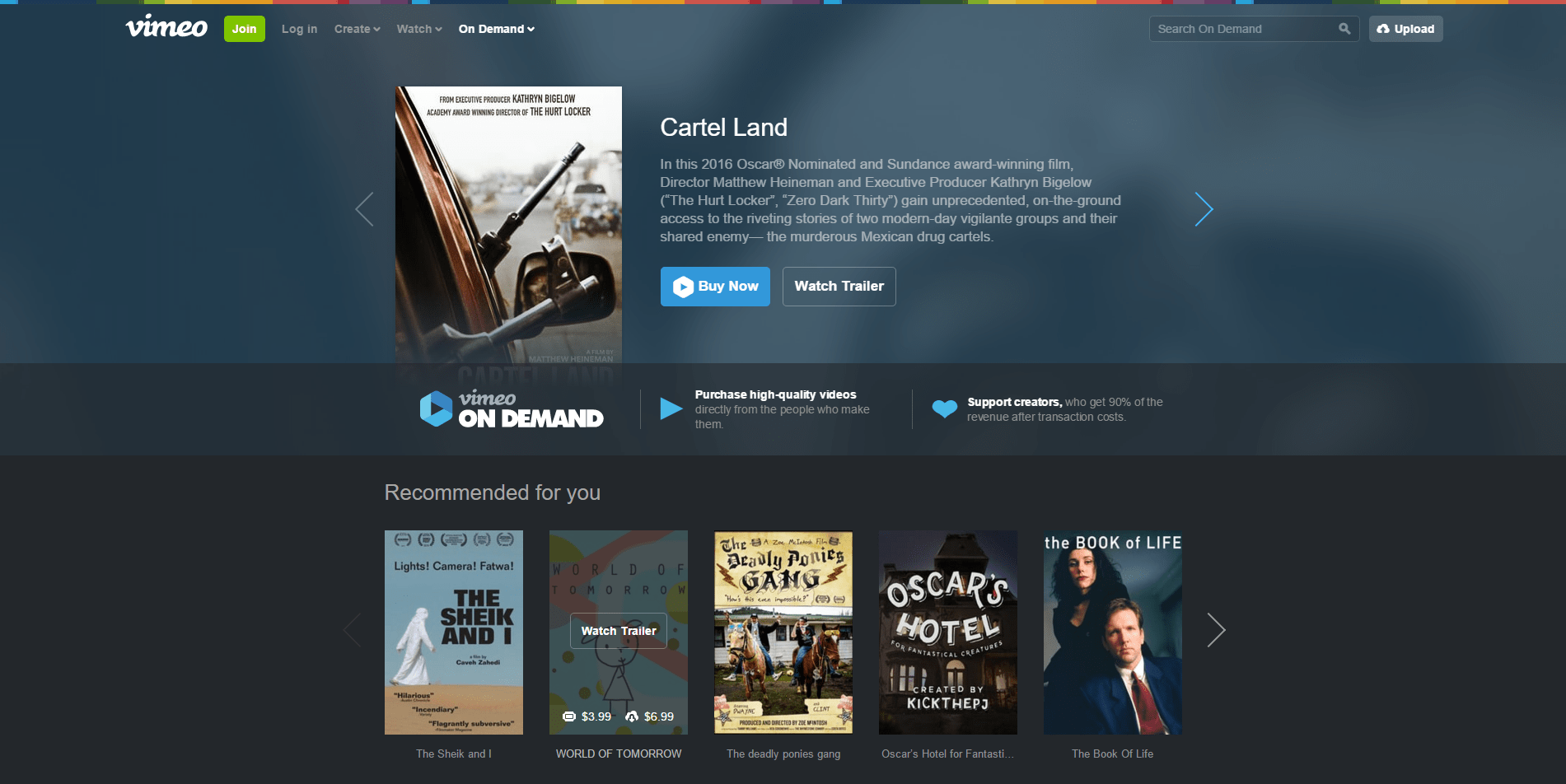
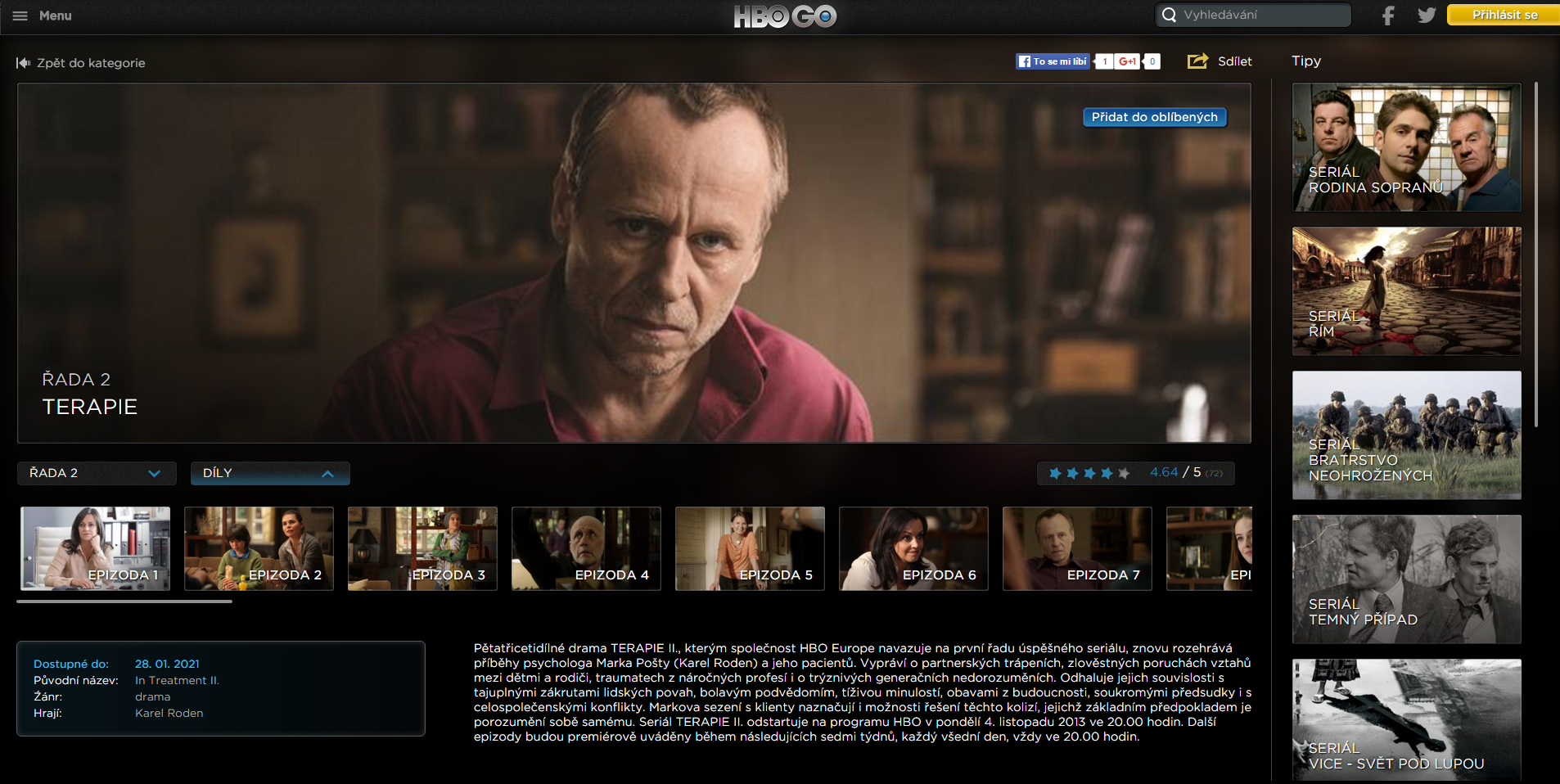
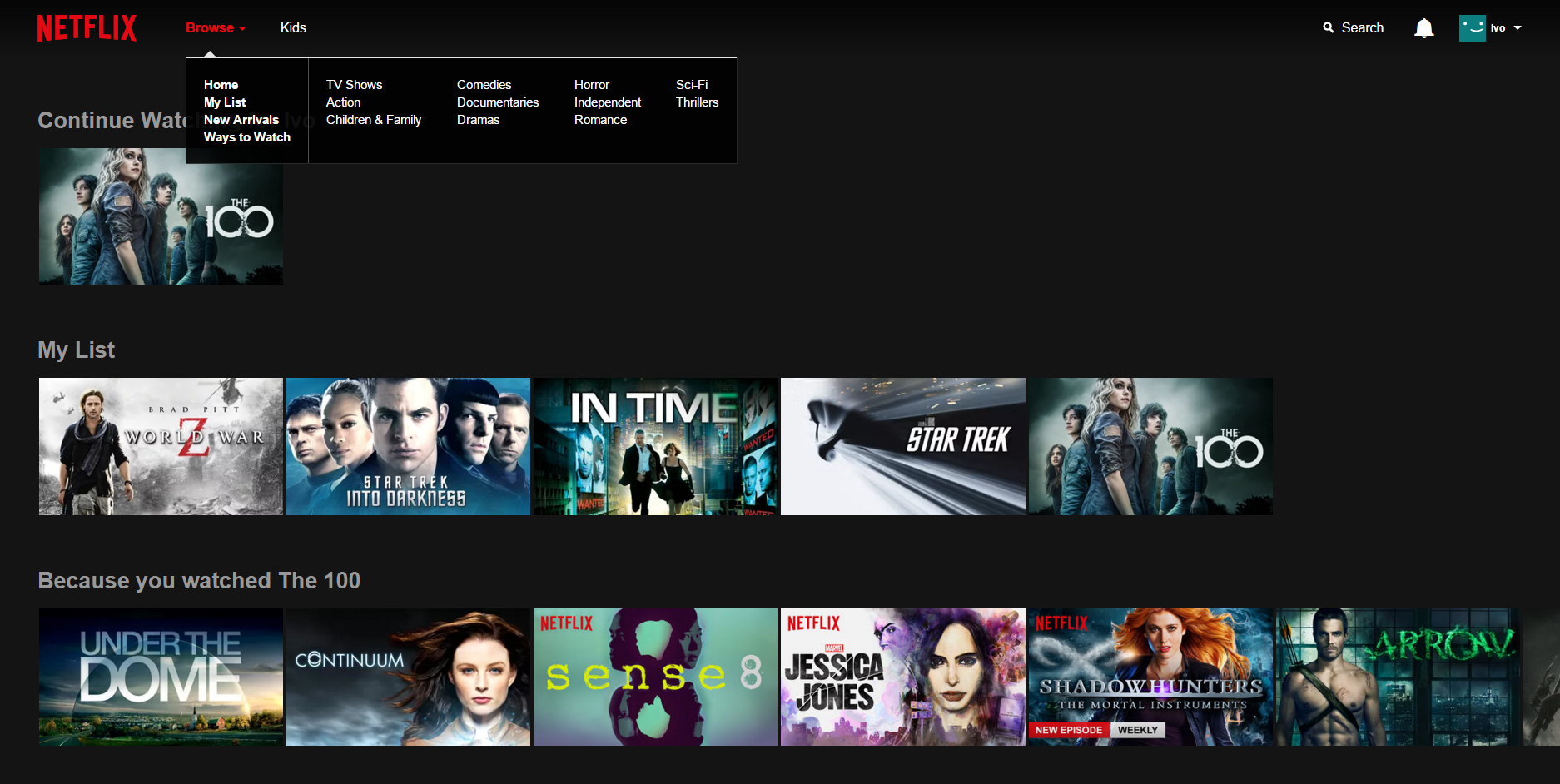
As part of the feasibility study, we conducted thorough research into competing streaming
services.
The client should not pay the full amount for an experimental solution that may not work
During the preparations, we got an idea how to accelerate the development of the platform by six months and significantly reduce the cost. Not to try to re-invent the wheel, we wanted to use existing services (such as the encoding module and repository) and integrate them. But it was not 100% sure that they would work perfectly together.
Before the development, we agreed with the client that we would first develop a proof of concept, which would be used to verify our ideas. We went into it with the knowledge that maybe the whole idea of accelerating development by six months and lowering the price would not work and we would go the original way.
Specifically, we connected:
- Bitmovin
- EZ DRM
- Google Cloud Storage
The biggest challenge was the integration of the encoding module with DRM (Bitmovin and EZ DRM). We encountered a minor error in the EZ DRM documentation, which we had to consult directly with the service provider. However, we managed to resolve it and development continued on after a few days.
What is DRM
DRM, or Digital Rights Management, is a digital system for verifying that a user has the right to view the desired content under the license terms. Major companies such as Warner Bros., Paramount Pictures, Sony and others require this to view their films and series.
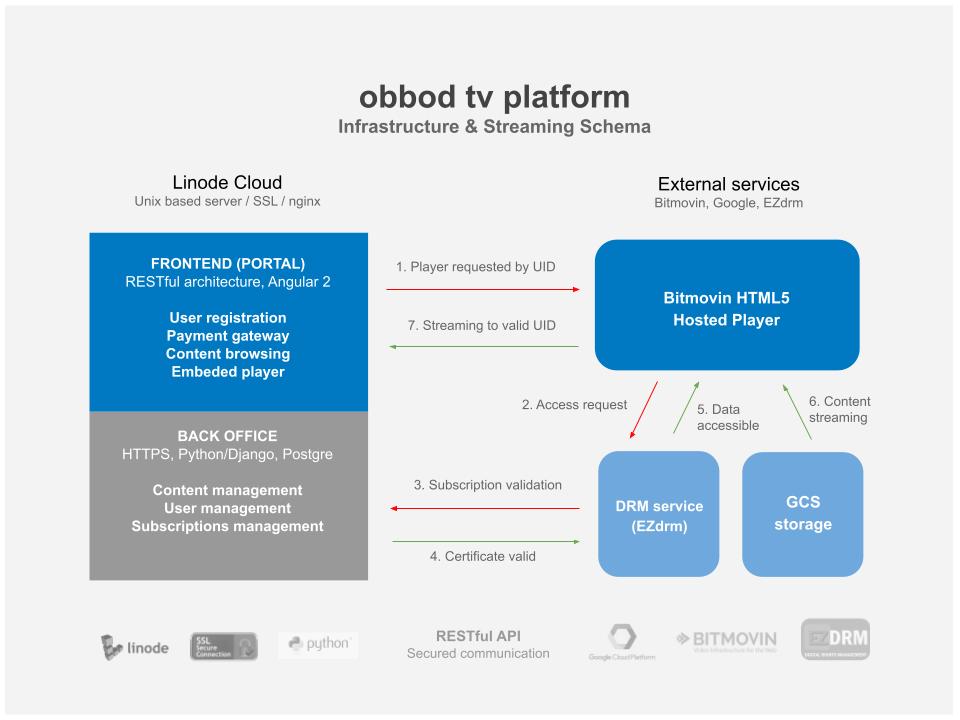
And that won us the tender
Thanks to the integration, we were able to create a functional one-page prototype, on which the encoded trailer of the Obbod TV series Vyšehrad with DRM could be launched.
After the successful prototype, further development focused on:
- front end,
- back office (i.e., a system for managing users, subscriptions, videos and additional information about them),
- UX / UI,
- interconnection of different services; and
- load optimization.
„The client chose us because we were able to create a working prototype of video encoding with DRM, which also included a demonstration of video playback in the browser. In addition, thanks to the integration of existing services, we offered an affordable price and deadline.“
Ivoš Gajdorus,
founder COex
Sample wireframe of a movie detail page.
Timeline of cooperation
From winning the tender, we only had 5 months to prepare for the launch. However, we managed to deliver the Vysehrad series to Czech households for Christmas.
2015
December
Beginning of the tender
2016
February
feasibility study and market analysis
2016
June
one-page prototype
2016
October
main stages of development
2016
November
pilot test
2016
19. Decemder
official launch
Work progress in the development of the Czech Obbod TV streaming platform.
Used technologies and services
We decided on a reliable combination of back-end and front-end technologies. We would highlight the following:
- The platform is written in the Python programming language;
- using the proven Django web framework;
- back-end and front-end communicate using RESTful API;
- front-end is powered by Angular framework by Google;
- we used the Bitmovin tool for video encoding;
- we used Google Cloud Storage as storage.
You can find out more about the tools and technologies we use at COex on the web technologies page.

Obbod TV player handles multiple audio tracks as well as different subtitle languages.
Verifying licenses on various devices was a brainteaser
DRM put up another challenge for us during development. Google, Apple, and Microsoft, each of them has their own access - so we had to use different DRM encoding for each device and browser.
We learned that a streaming platform cannot always be compatible with everything. For example, Windows XP does not support DRM at all, and Apple handles encoding differently than others. It was within Apple where resolving the problem with license keys for DRM was trickiest.
Another nut to crack was the inclusion of several audio tracks in the videos and various language versions of the subtitles. The Bitmovin player we chose supports both of them, however, it doesn't understand diacritics. We therefore had to teach it Czech.
At the end, we launched the project only two days later than planned and Vysehrad reached Czech households before Christmas.
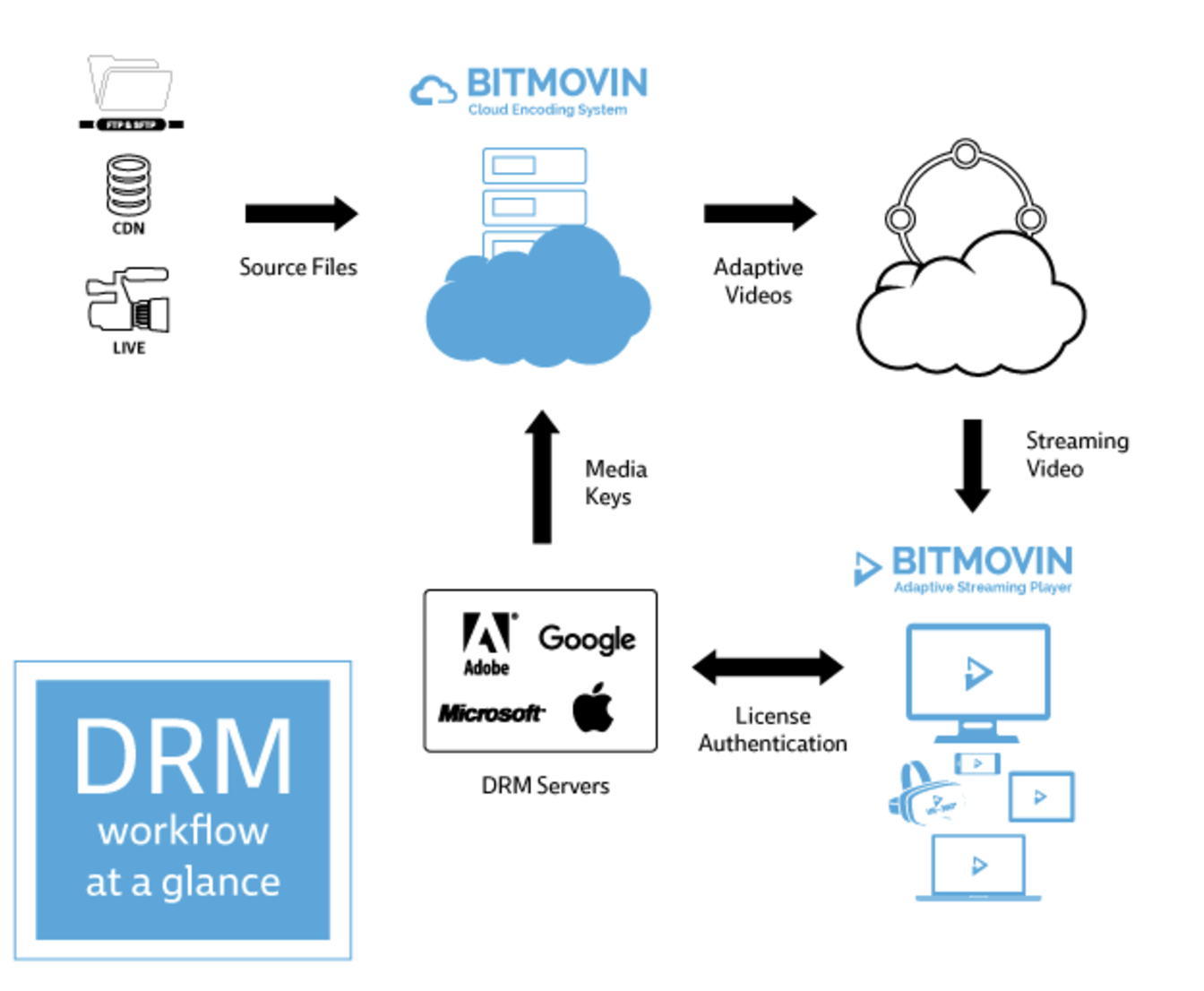
The platform can also handle heavy traffic
The Vysehrad series immediately became a blockbuster. As early as the beginning of January, i.e. during the busiest period, Obbod TV was being watched by 170,000 viewers a day. Thanks to stress testing and experience from the first days of operation, we tuned load balancing to handle high traffic.
From analysis to proof of concept to the official launch, the whole development process lasted only eight months, took thousands of hours of work and was a really big project in the Czech environment in such a short time. In addition, we were able to suggest to the client how to speed up the whole process and reduce costs, and we tested our ideas before the development itself to minimize risks.
We thus successfully fulfilled the goals of the brief: we created a Czech online TV platform which offers lesser-known shows, adds works of its own production, and targets Czech viewers. 500+ films and series have gradually appeared on Obbod TV.
In addition, we were able to help the client with product design in the really strong - also in terms of business - competitive environment of Czech online TV platforms. And at COex, we've expanded our know-how about managing heavy traffic using load balancing.
1 000 000+ watching the series in 2 weeks
5 000+ views daily
230 000+ users
„COex has done a great job right from the start. I appreciate their selection of technologies, implementation, launch and subsequent improvement of the project. I personally appreciate their proactive approach.“
